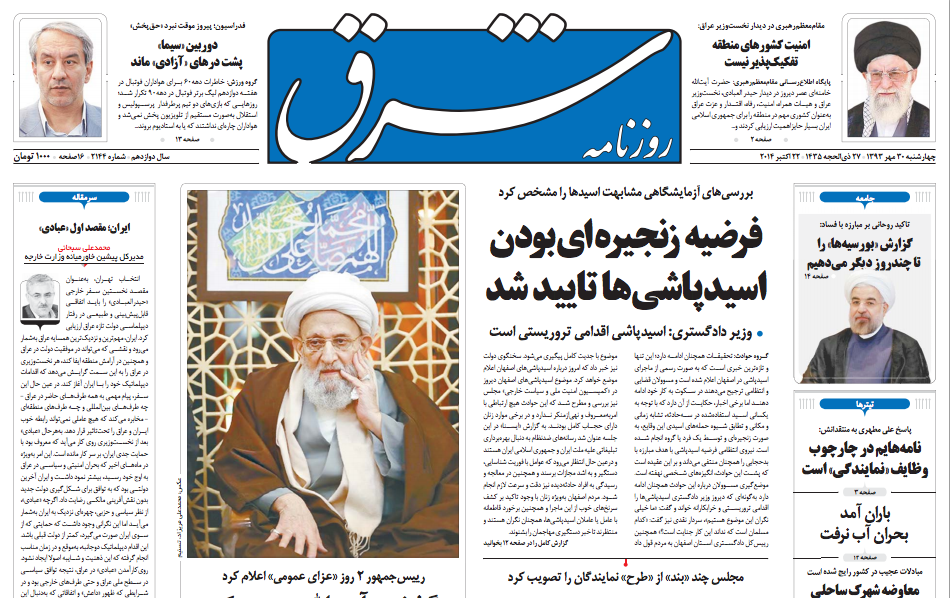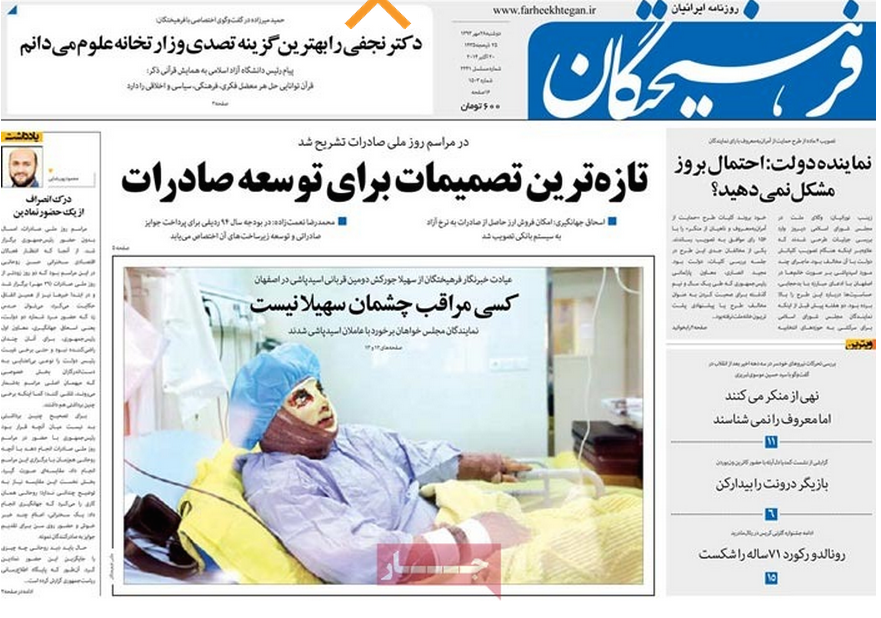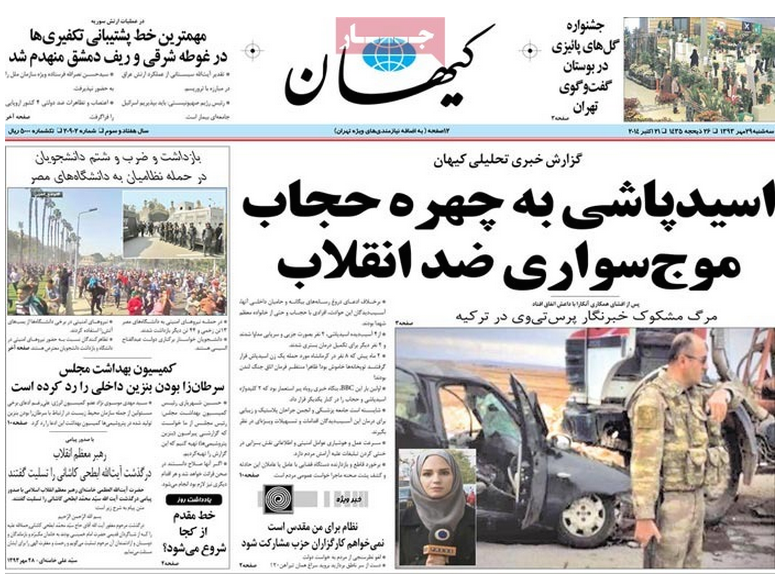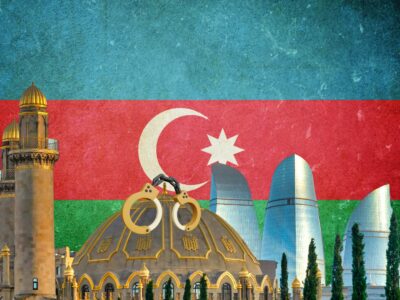
The front page of one of the most popular reformist dailies, Shargh, discusses the theory that the attacks are linked to a nationwide organized association trying to eradicate bad hijab.
A wave of acid attacks in Isfahan against women over the past few weeks has created a sense of uproar within Iran. Authorities claim there have been four attacks, while social media say 10.
The controversial elements of the story, namely the cause of the attacks, and the lack of monitoring by authorities has rippled through Iran's often factionalized media, with some conservative publications passing off foreign and reformist coverage of the attacks as an attempt to drum up discontent within the Islamic Republic.
This past week, the government-affiliated newspaper Iran and the reformist Etemaad both printed within their pages “A public outcry against the perpetrators of acidpashi (acid attacks).” Etemaad newspaper noted the nature of fear amongst the women of Isfahan in the following passage:
«خبرهای ناگوار اسیدپاشی در اصفهان، امنیت مردم شهر را مختل کرده است، امنیتی که زنان و دختران این شهر، با کمتر ظاهر شدن در معابر عمومی و حبس کردن خود در خانه برای خود فراهم میکنند. آنهایی هم که بیرون میآیند، با ترس و اکراه شیشه ماشین را پایین میآورند و به سرعت برق و باد کارشان را در خیابان انجام میدهند تا دوباره خودشان را در شیشههای بالاکشیده خودروشان محصور کنند.»
The unfortunate news of acidpashi in Isfahan, has disrupted the security of the people of this city, especially that of women and girls , resulting in these women from often withdrawing from appearing in public and remaining at home. And those who do come out, come with a fear and reluctance to even roll down their windows and when they do come out to the streets, they finish their work with the speed of electricity and wind so they can go back to hiding behind the enlcosed windows of their Khodro's.
Another reformist newpspaper, Fahreekhtegan, ran a notable front page with one of the victims of the attacks, Soheila Jowrkesh. The Jowrkesh family told Fahreekhtegan that the attackers had warned the city they would “deal” with women with bad hijab.
Hijab, or Islamic dress code (sometimes spelled “hejab”), is enforced by the state on women since the 1979 Islamic revolution. Hijab requires women to cover their heads and wear modest clothing. Iranian women have been known to push the boundaries of hijab, often revealing their hair beneath colourful headscarves, and wearing tight coats and makeup. This has led to conservative reactions, asking elements in government and society to take action.

Reformist newspaper Fahreekhtegan runs a front page dedicated to one of the victims of the attack, Soheila Jowrkesh. This stands in contrast to most conservative newspapers, who have dedicated little to no coverage of the incidences.
Newspapers associated with conservatives in Iran have remained oddly silent or limited in their coverage of the attacks in Isfahan. Iran's leading conservative newspaper, Kayhan, associated with Supreme Leader Ayatollah Khamenei's office, has ran little to no coverage on the incidents, finally dedicating its Tuesday, October 22, 2014 frontpage with a headline that read: “Acidpashi in the face of hijab is used to create a wave of anti-revolutionary sentiment.” Kayhan wrote, “Contrary to the lying reports of foreign media and their domestic supporters, the victims of these incidents are women with proper hijab, and some of them from martyr families.”
According to Shahram Rafizadeh's newspaper report in Radio Farda, Kayhan has accused reformist newspapers like Iran, Arman, Asrar, Khabar Online, Ebtekar, and Isfahan Ziba of publishing news related to the attacks in order to destroy the image of the “believers” and “supporters” of the Islamic regime.

Conservative newspaper associated with the office of Supreme Leader Ayatollah Khamenei speaks out against other media covering the attacks. Their headline states: “Acidpashi in the face of hijab is used to create a wave of anti-revolutionary sentiment.”
Coverage of the news in conservative newspapers have largely been reactionary to other media, rather than focused on covering the news, or why these assaults have been occurring. Much of the blame for the attacks has been placed on conservative elements inside Iran, especially since lawmakers have proposed a bill that would give vigilantes legal protection to enforce hijab. In a report in Radio Free Europe/Radio Liberty, an Iranian woman explains, “[Hard-liners] have been spreading hatred against women, therefore many believe they are behind the attacks.” Many concerns against the lack of inaction by authorities reflects the conservative media's limited attention to covering who are behind the attacks, and what is causing them.
Many on social media have been reporting on the incident using the hashtag #اسیدپاشی (#acidpashi). Tweets have related stories of the terror and fear the attacks have created within Iran.
تصویر سازی بزرگمهر حسین پور برای دختران اصفهانی #اصفهان #اسیدپاشی pic.twitter.com/ke0oRVV21e
— mehrdad (@mehrdad0451) October 20, 2014
Bozorgmehr Hosseinpour's illustration of Isfahani girls #Isfahan #acidpashi
@ManaNeyestani‘s cartoon on #acidattacks in #Iran, and those who does such vicious acts 2 spread fear amongst women! pic.twitter.com/ERRBOul9uZ
— Omid Memarian (@Omid_M) October 21, 2014
قربانی #اسیدپاشی “مریم- د”: غروبها از ترس و شبها از درد جیغ و فریاد میکنم.
— Persian Banoo (@persianbanoo) October 20, 2014
Victim of #Acidpashi “Maryam-D”: Evenings of fear and nights of pain I scream and shout.
دوست اصفهانیم میگه شایعه سرزبونها افتاده که اسیدپاش پدر یه بچهی 6 ساله بوده که تو تصادف با یه راننده زن مرده.خیلی سینمایی طور! #اسیدپاشی
— Niusha Saremi (@NewshaSaremi) October 20, 2014
My friend from Isfahan tells me there is a rumour amongst people that the person who threw the acid was a father of a six-year-old who was killed in a car accident by a woman. It's such a Hollywood story. #acidpashi
قبلا هم گفتم که قبل از اینکه به توحش #داعش گیر بدیم، بد نیست فکری به حال خودمون و اسیدهایی که پاشیده میشود بکنیم. #اسیدپاشی
— Amin Sabeti (@AminSabeti) October 19, 2014
I've said this before, that before we get stuck in the savagery of #daesh [ISIS], it is not bad to think about our own state and the acid that is thrown at us. #acidpashi







2 comments